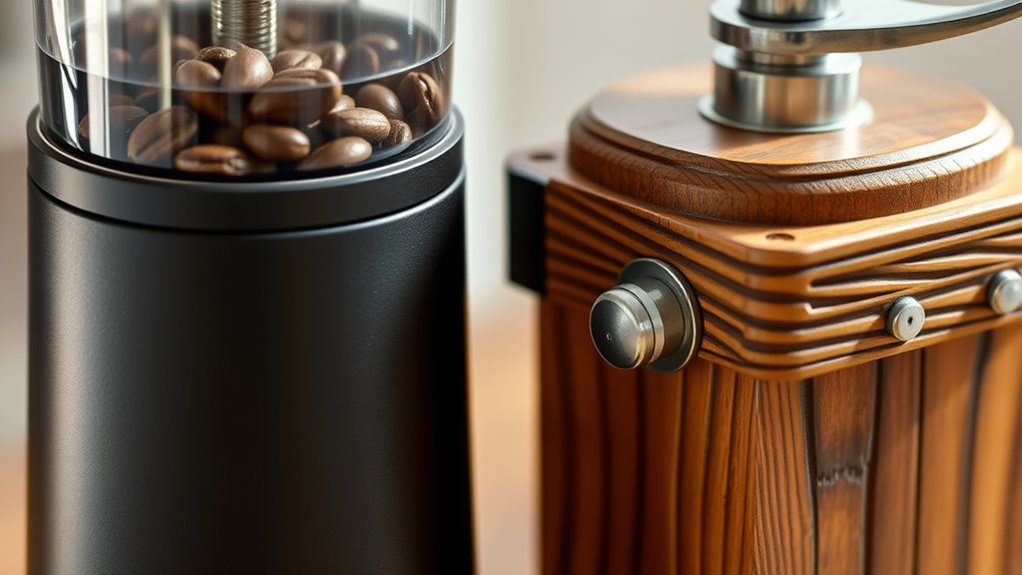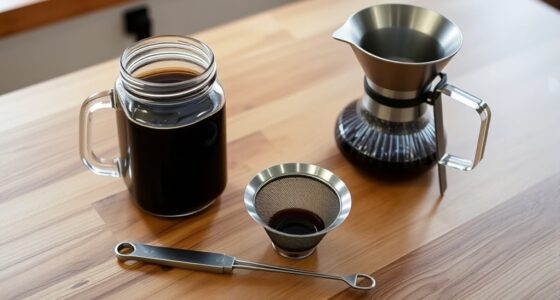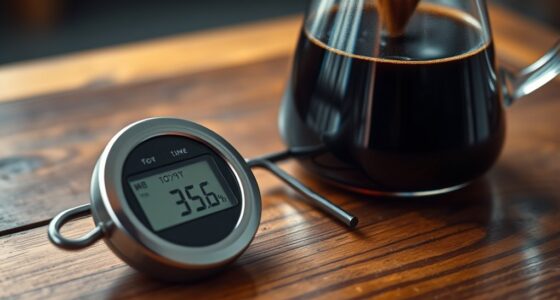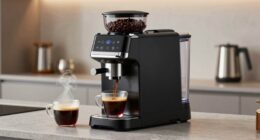Choosing between a hand grinder and an electric one depends on what matters most to you. If you want portability, a manual grinder is lightweight and great for travel or camping. For quick, consistent results at home, an electric grinder saves time and guarantees uniformity. Consider your lifestyle—if you enjoy a hands-on brewing ritual, a hand grinder offers a satisfying experience. To discover more about which fits your needs best, keep exploring the key differences.
Key Takeaways
- Choose a manual grinder for portability, quiet operation, and a hands-on brewing experience.
- Opt for an electric grinder if you prioritize quick, consistent grinding for daily use.
- Manual models are ideal for coarser grinds like French press or cold brew, offering decent consistency.
- Electric grinders save time and are better suited for brewing large quantities efficiently.
- Consider your lifestyle—manual for travel and ritual, electric for convenience and speed.

When choosing between a hand grinder and an electric grinder, understanding your brewing needs and preferences is essential. Your decision hinges on factors like grinding consistency, portability, and convenience. If you’re someone who values precision in your coffee, a good electric grinder might be the way to go. Electric models generally provide more uniform grind sizes, ensuring each brew has the right extraction. This consistency is vital if you’re particular about your coffee’s flavor profile or if you brew frequently. On the other hand, a hand grinder can also produce decent consistency, especially high-quality manual models, though it might require a bit more effort. If you enjoy the process of making coffee and want a grind that’s consistently even, a manual grinder can deliver satisfactory results, especially for coarser grinds like French press or cold brew. Additionally, choosing the right grinder can enhance your overall brewing experience, making it more enjoyable and satisfying.
Portability and convenience are major considerations. Hand grinders shine in this area. They’re lightweight, compact, and don’t rely on electricity, making them perfect for travel, camping, or situations where power isn’t readily available. With a hand grinder, you can enjoy freshly ground coffee anywhere, without worrying about outlets or bulky equipment. It’s a simple, low-maintenance option that fits easily into a bag or backpack. Moreover, manual grinding techniques can help you develop a deeper appreciation for the entire brewing process. Conversely, electric grinders are larger and require an outlet, so they’re better suited for home use or a dedicated coffee station. While they might take up more space, they save you time and effort with their quick grinding capabilities. If you often brew coffee on busy mornings or need to grind larger quantities quickly, an electric grinder offers unmatched convenience.
Your lifestyle and how much effort you’re willing to put in also influence your choice. If you love the ritual of grinding your beans and don’t mind some manual labor, a hand grinder provides a satisfying, hands-on experience. Plus, they tend to be quieter and less intimidating for beginners. If you prioritize speed, uniformity, and ease, an electric grinder will meet those needs efficiently. It’s also worth considering noise levels; electric grinders can be loud, which might be disruptive in shared spaces, whereas hand grinders are usually much quieter.
Ultimately, your decision depends on balancing how much importance you place on grinding consistency, portability, and convenience. Both types have their strengths, so think about where and how you’ll use your grinder most often. Whether you prefer the simplicity and mobility of a hand grinder or the speed and uniformity of an electric model, understanding your specific brewing habits will guide you to the right choice.
Frequently Asked Questions
Which Grinder Is Better for Outdoor Use?
For outdoor use, you’ll want a grinder that offers portable convenience and withstands durability concerns. Hand grinders are lightweight, easy to carry, and don’t rely on electricity, making them perfect for camping or hiking. Electric grinders may be more powerful but can be bulky and less reliable without power sources. Choose a hand grinder for ultimate portability and durability, ensuring it’s simple to use in remote or outdoor settings.
Can Hand Grinders Produce Consistent Grind Sizes?
You might be surprised, but hand grinders can produce surprisingly consistent grind sizes if you’re patient and attentive. With manual consistency and careful adjustments, you can achieve excellent grind uniformity, though it takes more effort than electric options. The key lies in steady hand movements and precise control. So, if you’re willing to invest time, a hand grinder can deliver reliable results, especially for brewing methods that appreciate a uniform grind.
Are Electric Grinders More Durable Than Hand Grinders?
Electric grinders generally offer better durability due to their superior material quality and sturdy construction. They’re designed to handle frequent use and tougher beans, making them more reliable long-term. Hand grinders, while durable, rely on manual components that may wear out faster with heavy use. So, if you’re looking for a product with a higher durability comparison, electric grinders tend to outperform hand grinders, especially for daily or high-volume grinding.
How Much Maintenance Do Electric Grinders Require?
Electric grinders require regular maintenance to keep grinding consistency high. You should clean the burrs or blades weekly to prevent buildup and guarantee peak performance. Depending on usage, maintenance frequency might be once a month or more often if you grind daily. Keep an eye on motor health and replace parts as needed to avoid breakdowns. Proper upkeep will help your electric grinder last longer and deliver consistent, quality grounds.
Is a Hand Grinder Suitable for Commercial Use?
A hand grinder isn’t ideal for commercial use because it’s designed for manual grinding, which can be slow and tiring for extensive tasks. While it offers portability advantages and allows you to grind coffee anywhere, it lacks the efficiency and consistency needed in busy settings. For commercial purposes, an electric grinder provides faster, more uniform results, making it the better choice for high-volume grinding needs.
Conclusion
Ultimately, choosing between a hand grinder and an electric grinder depends on your lifestyle and values. Some say that hand grinding connects you to tradition and offers a more personal experience, making each brew special. Others believe electric grinders save time and deliver consistency. But what if the real truth is that the best choice isn’t about convenience or tradition, but about embracing your passion? Trust your instincts—you’ll find the perfect grind that fuels your love for coffee.









